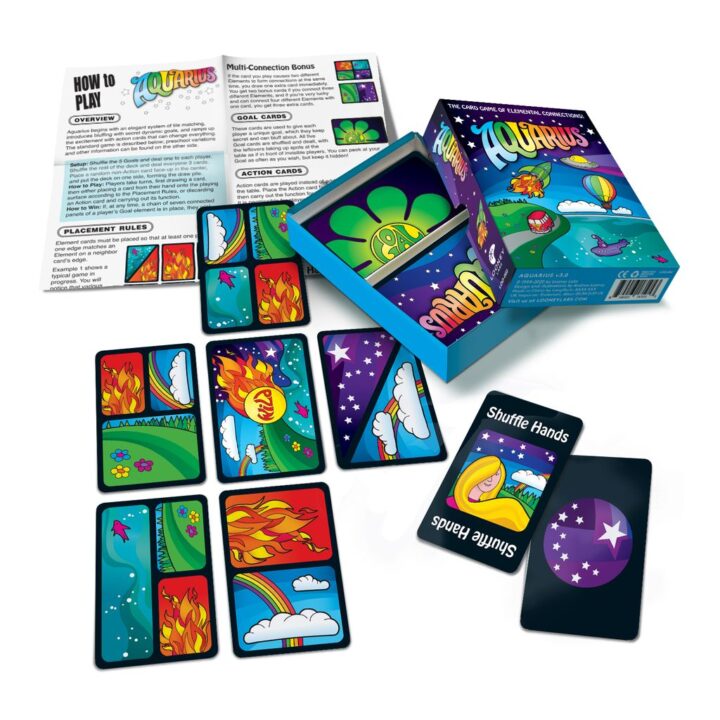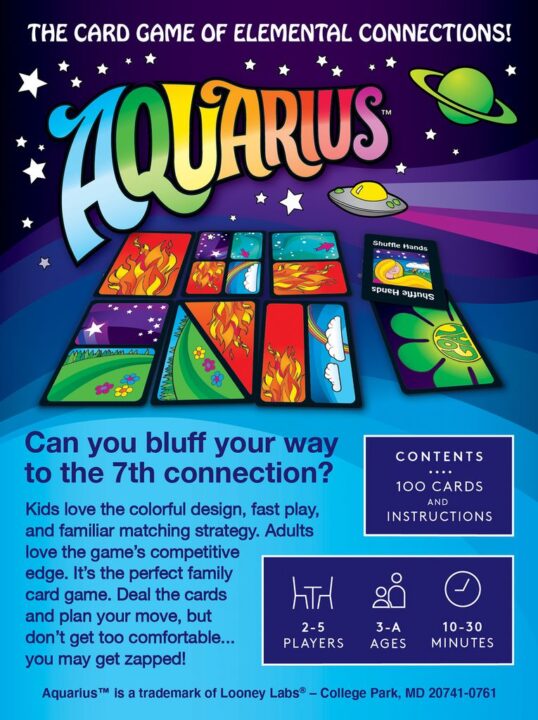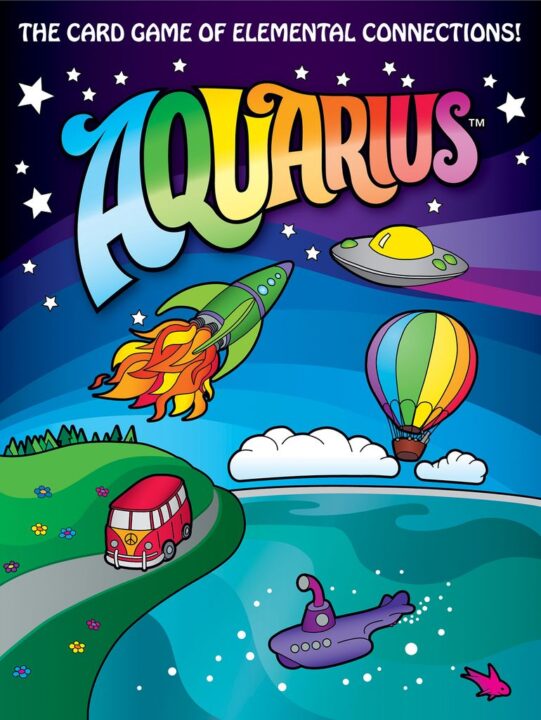Every now and then, I stumble across a board game that throws logic out the window and replaces it with a confetti cannon of chaos. This review takes a look at Aquarius—a game that will make you question your friendships, your luck, and maybe your sanity. Grab your friends, shuffle up, and let’s see what’s good, what’s groovy, and what’s just plain bonkers about this psychedelic little card game.
How It Plays
Setting up
Shuffle the Aquarius deck and deal each player one secret Goal card. Give each player three cards. Put the remaining deck in the center. Place a single card from the deck face-up as the starting tile.
Gameplay
Players take turns playing one card from their hand. Cards add new terrain to the shared grid. You try to connect spaces matching your hidden Goal. Watch out! Action cards let you swap Goals or mess with other players’ plans. After you play a card, draw back up to three.
Winning the game
As soon as you connect seven squares of your Goal’s element, shout “Groovy!” (okay, that’s optional). You win the game and get bragging rights—at least until the next round!
Want to know more? Read our extensive strategy guide for Aquarius.
How Aquarius Mixes Chaos and Cleverness: Game Mechanics & Player Interaction
I’ll never forget the first time I played Aquarius. My friend Carl slapped down his card, grinned like a lunatic, and immediately ruined my whole master plan. That’s Aquarius for you—a game where the mechanics make you think you’ve got everything under control, until someone does something bonkers. The rules are simple: match elements on the edge of your cards, and try to quietly reach your secret goal before everyone else figures it out. But trust me, it’s never that peaceful.
See, Aquarius is all about easy setup and fast turns. You have a hand of cards, each with one to three colorful elements (water, earth, fire, air, space). You play cards down to expand a whimsical patchwork on the table. On your turn, you match an element, play an action card—or, if you’re feeling spicy, swap hands with somebody and watch their dreams crumble. Yes, I have been on the receiving end of that, and no, it’s not fun. But it sure makes everyone laugh.
The player interaction is spicy. Actions like trading goals, shuffling hands, or even “Zap”ping cards from the table keep everyone on their toes. You can try to bluff, but you’ll need eyes everywhere because your friends can and will mess with you. If you hate randomness and shenanigans, Aquarius might test your patience. But if you like a bit of chaos with your coffee, you’ll have a blast.
Next up, I’ll talk about whether Aquarius looks as wild as it plays—prepare your eyeballs for some vivid card art talk!

Bright Colors and Groovy Vibes: The Artwork and Card Design of Aquarius
If you grew up anywhere near a tie-dye shirt or remember when lava lamps were cool (don’t tell me they’re not cool now), Aquarius is going to light up your eyeballs. The cards burst with neon blues, pinks, and yellows, like a rainbow wearing sunglasses. Every card in Aquarius feels like it just stepped out of a 1970s acid trip, in the best possible way. There are five different element symbols: fire, water, earth, air, and space. Yes, space! Who doesn’t want to make a match with mysterious swirling space?
Now, let’s talk about card quality. After a few sessions—during which my nephew tried to use the deck as ninja throwing stars—I can say these cards hold up pretty well. They’re not quite casino-level, but the finish helps hide most sticky fingerprints and minor juice-box disasters. The art and design make it easy to spot different elements at a glance, which keeps the game moving fast (unless someone’s uncle is staring at the trippy backgrounds and forgetting it’s their turn again).
Icons are big, bold, and friendly for newcomers or kids, so nobody’s squinting or holding a magnifying glass. No tiny text or confusing symbols to ruin your fun here. The only thing missing? I’d love just a tiny dash more theme on the backs—maybe a smiling moon or a glittering comet. But that’s just me being picky. Next, I’ll spill the beans on how many times you’ll actually want to play Aquarius, and just how long you’ll be stuck to your seat!

Replay Value and Game Length in Aquarius
When it comes to replay value, Aquarius really pulls its weight at game night. I’ve played this game so many times, I started naming my favorite cards (hello, Waterfall!). Each round feels fresh because the goal cards are dealt out randomly, and the board grows differently every time. The game makes sure no two matches play out the same. If you’ve got that one friend who loves to stir the pot or just can’t resist blocking your perfect plan, you’ll find the player interaction here keeps things lively and unpredictable.
Let’s talk game length. Aquarius is like that friend who shows up, tells a hilarious story, and leaves before the punchline wears thin. Most games last about 15 to 30 minutes depending on how many people are playing and how much smack talk is happening. I played one four-player round that wrapped up in under twenty minutes—just enough time for snacks and plotting your revenge. If you want to play “just one more,” you actually have time for it before everyone gets bored or has to leave. This makes it perfect for filling in those awkward half-hour gaps at parties or when you’re waiting for someone else to arrive.
What really surprised me was that Aquarius holds up even after a dozen plays. It’s simple enough to teach new folks, but wild enough for seasoned gamers to get into. Next up, I’ll share if skill or luck rules the day in Aquarius—or if, like my last pizza delivery, it’s a bit of both…

Skill vs. Luck: How Much Control Do You Really Have in Aquarius?
Let’s talk about the hot debate in board games: skill versus luck. When I first played Aquarius with my friends, I thought it would be a mellow, peaceful night matching up pretty colors. Boy, was I wrong. By the second round, my friend Mark was cackling like a movie villain while swapping my goal card for his. There was luck, but there was also a sneaky pile of skill hiding underneath.
In Aquarius, you get dealt a secret goal, and you try to connect seven matching elements on the board. Sounds easy, right? But every turn, you either play a card, or you use an action card to mess with someone’s plans. Sometimes, these action cards feel like pure chaos—let’s be honest, luck plays a big role. I once had the perfect board and then BOOM! Someone swapped the goals around. Suddenly, I was helping my opponent win.
But don’t write the game off as a pure luck-fest. The way you place your cards really matters. You watch the board, try to read what others are doing, and sometimes you pull a sneaky move that makes everyone groan. Bluffing and subtle sabotage are all over the place if you pay attention. Yet, if the action card deck hates you, there isn’t much you can do.
All things considered, Aquarius leans more on luck than skill. If you dislike games where a well-played plan can get zapped in a heartbeat, this might drive you nuts. But if you enjoy laughs, shenanigans, and don’t mind unpredictable twists, you’ll have a good time.
I recommend Aquarius as a fun, light game, especially for parties or families. Just don’t expect to outsmart everyone every time!
Conclusion
Wrapping up, Aquarius brings some wild, colorful fun to the table. The game is quick to set up, easy to learn, and always a bit chaotic. If you crave deep strategy or dislike luck, Aquarius isn’t your holy grail. But if you want fast, silly action with friends (and maybe a bit of friendly backstabbing), this one’s hard to beat. I laughed, I lost, I accused my best friend of cheating—classic game night stuff. That’s it for my Aquarius review. Until next time, may your cards always line up and your friends never hold a grudge!

